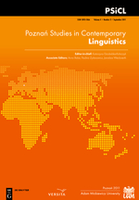
Poznan Studies in Contemporary Linguistics
Scope & Guideline
Bridging theory and practice in language studies.
Introduction
Aims and Scopes
- Empirical Linguistic Research:
The journal prioritizes empirical investigations across various languages, employing methodologies such as corpus linguistics, experimental studies, and fieldwork to gather data and validate linguistic theories. - Cross-Cultural and Multilingual Perspectives:
A consistent focus is placed on the interaction of language and culture, exploring how linguistic phenomena manifest across different languages and cultural contexts. - Pragmatics and Discourse Analysis:
The journal publishes work that delves into the pragmatics of language use, including discourse analysis, metaphor studies, and the pragmatics of identity and gender. - Syntactic and Morphological Studies:
There is a strong emphasis on syntactic structures and morphological processes, with research exploring the complexities of grammatical constructions in various languages. - Language Acquisition and Processing:
Research on first and second language acquisition, bilingual processing, and the cognitive aspects of language use is a significant area of interest, contributing to our understanding of how languages are learned and processed.
Trending and Emerging
- Computational Linguistics and Data-Driven Approaches:
Recent publications highlight a growing trend towards computational methods and data-driven analyses, indicating an increased interest in quantitative approaches to linguistic phenomena. - Metaphor and Cognitive Linguistics:
There is a notable rise in research exploring metaphor and its cognitive implications, reflecting a broader interest in how language shapes thought and cultural understanding. - Interdisciplinary Studies:
Emerging themes indicate a trend towards interdisciplinary research, integrating insights from sociology, psychology, and cultural studies to enrich linguistic analysis. - Language and Identity:
The exploration of language in relation to identity, including gender, ethnicity, and social positioning, has gained traction, highlighting the role of language in social dynamics. - Bilingualism and Multilingualism:
An increasing focus on bilingual and multilingual contexts is evident, with studies examining language processing, acquisition, and the sociolinguistic implications of multilingualism in diverse settings.
Declining or Waning
- Traditional Syntax Theories:
There appears to be a waning interest in traditional syntactic theories that do not incorporate modern empirical methods or cross-linguistic perspectives, as newer studies focus on more dynamic and context-sensitive approaches. - Historical Linguistics:
Research focusing on historical linguistics and the evolution of languages has been less prominent, indicating a possible shift towards more contemporary linguistic phenomena and their applications. - Purely Descriptive Studies:
There is a noticeable decline in purely descriptive studies that do not engage with theoretical frameworks or empirical data analysis, as the journal increasingly favors studies that contribute to wider theoretical debates.
Similar Journals

Languages
Advancing linguistic frontiers through open dialogue.Languages, published by MDPI, is a prestigious open-access journal dedicated to the field of Linguistics and Language studies. Since its inception in 2016, this journal has rapidly established itself as a leading platform for high-quality research, achieving an impressive Q1 ranking in 2023 and standing out in both the Arts and Humanities as well as the Social Sciences categories with significant percentile rankings (76th and 74th respectively). Based in Switzerland, Languages fosters an international community of scholars who are committed to exploring the multifaceted dimensions of language, from theoretical frameworks to practical applications. With a robust e-ISSN of 2226-471X, the journal prioritizes accessibility, allowing researchers, professionals, and students to freely engage with cutting-edge research and insights. By bridging the gap between theory and practice, Languages plays a crucial role in advancing our understanding of linguistic phenomena, making it an invaluable resource for anyone invested in the study of language.

Lingue e Linguaggio
Illuminating the Intersections of Language and SocietyLingue e Linguaggio, published by SOC ED IL MULINO, is a distinguished academic journal in the field of Linguistics and Language, hailing from Bologna, Italy. With an esteemed Q2 ranking in its category as of 2023, this journal is recognized for its contributions to both the arts and humanities as well as social sciences, achieving notable positions within Scopus rankings. It serves as a vital platform for researchers, practitioners, and students interested in exploring various linguistic phenomena, language dynamics, and theoretical frameworks. Although it operates under a traditional subscription model rather than open access, its comprehensive array of studies and publications provides significant insights and fosters academic discourse. With a publication period extending from 2002 to 2024, Lingue e Linguaggio continues to be a key resource for advancing the understanding of language in contemporary contexts.

NEUPHILOLOGISCHE MITTEILUNGEN
Navigating the Intricacies of Philology and Linguistic StudiesNEUPHILOLOGISCHE MITTEILUNGEN, published by the esteemed Modern Language Society, stands as a significant contribution to the domain of Language and Linguistics. With a history dating back to 1971, this journal has consistently provided an academic platform for researchers and scholars, navigating through the intricacies of philology and linguistic studies. Although it is indexed in Scopus with rankings reflecting its position in the Arts and Humanities and Social Sciences categories, it currently does not offer Open Access, which may require interested parties to seek institutional access for its wealth of content. The journal has experienced periods of coverage discontinuation in recent years, yet it remains a valued source for advancing the understanding of language theories and linguistic practices. Its location in Helsinki, Finland, offers a unique European perspective on global linguistic issues. The journal is ideal for those looking to engage with evolving linguistic trends and contribute to contemporary discussions in the field.
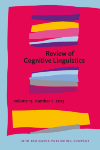
Review of Cognitive Linguistics
Innovating Perspectives in Cognitive Approaches to LanguageThe Review of Cognitive Linguistics, published by John Benjamins Publishing Co, is a premier academic journal dedicated to the exploration of cognitive approaches to linguistics. With an ISSN of 1877-9751 and E-ISSN 1877-976X, this journal provides a critical platform for researchers and professionals to disseminate their findings in the rapidly evolving fields of linguistics and language, alongside developmental and educational psychology. Hailing from the Netherlands, the journal boasts impressive standing within the academic community, as indicated by its 2023 Q1 ranking in Linguistics and Language and Q3 in Developmental and Educational Psychology. Additionally, its Scopus rankings reflect a strong position within the arts and humanities and social sciences categories. While currently operating under a traditional access model, this journal actively contributes to the overarching discourse within cognitive linguistics, and is a vital resource for those aiming to deepen their understanding of the intricate link between language and cognition. Researchers, educators, and students are encouraged to engage with the rich body of articles spanning its convergence years from 2010 to 2024, making it an essential read for those at the forefront of these interdisciplinary studies.
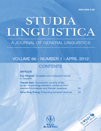
STUDIA LINGUISTICA
Navigating the Intersection of Language and PhilosophySTUDIA LINGUISTICA is a prestigious journal published by Wiley, focusing on the dynamic and multifaceted fields of Linguistics and Language. With an ISSN of 0039-3193 and an E-ISSN of 1467-9582, the journal has been a vital resource for academics since its inception in 1947, diligently converging insights from history and philosophy of science alongside contemporary linguistic research. Demonstrating excellent scholarly impact, STUDIA LINGUISTICA proudly holds a Q1 ranking in Linguistics and Language as well as a Q2 in History and Philosophy of Science as of 2023, indicating its significance within these academic domains. Furthermore, it ranks in the top percentiles among similar journals, with a commendable 73rd percentile in Language and Linguistics and 70th in related social sciences. Although it does not offer Open Access, its contribution to the discourse of language studies is underpinned by rigorous peer-review processes and commitment to advancing theoretical and empirical research. For researchers, professionals, and students alike, STUDIA LINGUISTICA remains an essential platform for disseminating impactful linguistic scholarship worldwide.
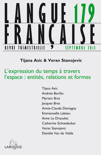
LANGUE FRANCAISE
Elevating Scholarly Dialogue on LinguisticsLANGUE FRANCAISE, published by LAROUSSE, stands as a premier journal in the realm of linguistics and language studies, boasting an impressive Q1 quartile rating in the 2023 Linguistics and Language category. With its international reputation anchored in France, this journal presents critical research and discussions that advance our understanding of the French language, its structures, usage, and evolution. Although not an open-access publication, LANGUE FRANCAISE is indexed with an ISSN of 0023-8368 and an E-ISSN of 1957-7982, reflecting its scholarly credibility and impact, including Scopus rankings that place it competitively in the fields of arts and humanities as well as social sciences. This journal serves as an essential resource for researchers, practitioners, and students aiming to deepen their knowledge and engage in scholarly debates that shape contemporary linguistic thought. The journal's commitment to high-quality research continues to foster an enriching academic environment and contribute to the dynamic discourse surrounding language and linguistics.
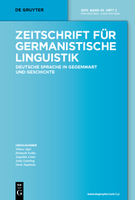
ZEITSCHRIFT FUR GERMANISTISCHE LINGUISTIK
Unveiling Insights in German Linguistic FrameworksZEITSCHRIFT FUR GERMANISTISCHE LINGUISTIK, published by WALTER DE GRUYTER GMBH, stands as a pivotal resource in the field of linguistics since its inception in 1973. With its ISSN 0301-3294 and E-ISSN 1613-0626, this esteemed journal serves as an essential platform for researchers and academics focused on the nuances of the German language and its linguistic frameworks. Catering to a diverse audience, the journal features high-impact articles and contributions consistent with rigorous academic standards, as evident from its Q1 categorization in Linguistics and Language and its notable rankings in both the Arts and Humanities and Social Sciences domains. The journal's commitment to advancing knowledge in linguistics fosters a scholarly environment conducive to both emerging and established linguists. While not available through open access, ZEITSCHRIFT FUR GERMANISTISCHE LINGUISTIK remains influential, drawing readers keen on exploring developmental and educational paradigms alongside linguistic theories. With a convergence of research that spans until 2024, it represents a comprehensive body of work integral to the evolving landscape of linguistic studies in Germany and beyond.

Estudios de Linguistica-Universidad de Alicante-ELUA
Navigating the Landscape of Contemporary LinguisticsEstudios de Linguistica-Universidad de Alicante-ELUA is a distinguished academic journal dedicated to advancing the field of linguistics, published by Universidad de Alicante. With an Open Access model adopted since 2020, ELUA facilitates greater accessibility to pioneering research for scholars and enthusiasts alike. The journal's ISSN is 0212-7636 and its E-ISSN is 2171-6692, ensuring it is indexed and easily discoverable in academic databases. Though the journal's H-Index is currently not specified, its commitment to disseminating high-quality linguistics research positions it as a valuable resource for researchers, professionals, and students. The journal aims to foster scholarly dialogue and innovation in various linguistic domains, making it an essential platform for sharing insights and findings that shape contemporary linguistic studies. Based in Alicante, Spain, ELUA is poised to contribute significantly to the global linguistics landscape.
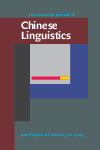
International Journal of Chinese Linguistics
Bridging Cultures Through Linguistic InsightInternational Journal of Chinese Linguistics is a distinguished publication that delves into various aspects of linguistic studies pertaining to the Chinese language. Published by John Benjamins Publishing Co, this journal stands out for its commitment to advancing the knowledge and understanding of Chinese linguistics within the global academic community. With an impact factor that places it in the Q2 quartile of linguistics and language, the journal is indexed in prominent databases, achieving ranks of #501 in Arts and Humanities and #580 in Social Sciences. These rankings reflect the journal's dedication to maintaining high scholarly standards and its relevance in both linguistic research and practical applications. While not categorized as Open Access, the journal provides necessary access through institutional subscriptions, thereby ensuring that valuable research reaches a broad audience. Covering a wide range of topics from syntax and phonetics to sociolinguistics and applied linguistics, the International Journal of Chinese Linguistics serves as an essential resource for researchers, professionals, and students seeking to deepen their understanding of the intricate relationship between language and culture in the Chinese context. With converging years from 2019 to 2024, it continues to evolve, reflecting ongoing developments in the field.
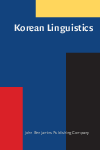
Korean Linguistics
Advancing Understanding of the Korean LanguageKorean Linguistics is a premier scholarly journal dedicated to the exploration and advancement of the field of linguistics, with a specific focus on the Korean language and its various dimensions. Published by John Benjamins Publishing Co., this journal is a vital resource for researchers, linguists, and students seeking to deepen their understanding of Korean linguistics and its contextual significance. With an ISSN of 0257-3784 and an E-ISSN of 2212-9731, Korean Linguistics has gained recognition for its rigorous peer-reviewed articles and contributions to the academic community, evidenced by its current ranking in the third quartile (Q3) of the Linguistics and Language category. The journal aims to foster scholarly dialogue and disseminate innovative research methodologies, theoretical advancements, and empirical studies spanning from 2022 to 2024. Although it does not operate under an open access model, its impact on the understanding of Korean linguistics remains significant, making it an essential publication for anyone keen to engage with contemporary issues and developments in this specialized field.